
Mystery at Olympia is a 1935 detective novel by John Rhode, the pen name of the British writer Cecil Street. It is the twenty second in his long-running series of novels featuring Lancelot Priestley, an armchair detective who was able to solve mysteries without visiting the scene of the crime. It was published in the United States under the alternative title Murder at the Motor Show.

In Face of the Verdict is a 1936 detective novel by John Rhode, the pen name of the British writer Cecil Street. It is the twenty fourth in his long-running series of novels featuring Lancelot Priestley, a Golden Age armchair detective. Unusually in the series Priestley takes a more active role in the investigation himself, rather than solving it from a detached distance. It was not published in the United States until 1940, by Dodd Mead, with the slightly altered title of In the Face of the Verdict.

Death in the Hopfields is a 1937 detective novel by John Rhode, the pen name of the British writer Cecil Street. It is the twenty fifth in his long-running series of novels featuring Lancelot Priestley, a Golden Age armchair detective. It was published in America by Dodd Mead under the alternative title The Harvest Murder.

Invisible Weapons is a 1938 detective novel by John Rhode, the pen name of the British writer Cecil Street. It is the twenty eighth in his long-running series of novels featuring Lancelot Priestley, a Golden Age armchair detective. A locked room mystery, the title revolves around the fact that two murders are committed by apparently invisible methods.
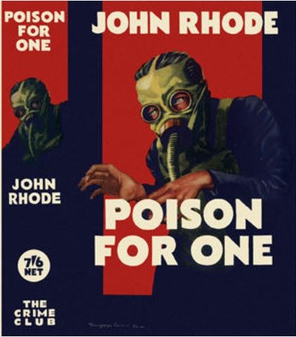
Poison for One is a 1934 detective novel by John Rhode, the pen name of the British writer Cecil Street. It is the eighteenth in his long-running series of novels featuring Lancelot Priestley, a Golden Age armchair detective. It combines elements of the locked room mystery and country house mystery. Reviewing the book in the Sunday Times leading crime writer Dorothy L. Sayers considered it "as usual, sound, pleasantly written, and entertaining" although she complained the book "was rather spoilt for me by the jacket, which deliberately gives away one-half of the solution."

Death on the Board is a 1937 detective novel by John Rhode, the pen name of the British writer Cecil Street. It is the twenty sixth in his long-running series of novels featuring Lancelot Priestley, a Golden Age armchair detective. It was published in the United States by Dodd Mead under the slightly altered title Death Sits on the Board.
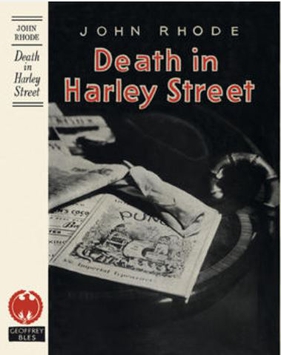
Death in Harley Street is a 1946 detective novel by John Rhode, the pen name of the British writer Cecil Street. It is the forty third in his long-running series of novels featuring Lancelot Priestley, a Golden Age armchair detective. Several sources consider it to be the author's masterpiece.

Up the Garden Path is a 1949 detective novel by John Rhode, the pen name of the British writer Cecil Street. It is the forty ninth in his long-running series of novels featuring Lancelot Priestley, a Golden Age armchair detective. It was published in America by Dodd Mead under the alternative title The Fatal Garden. Reviewing the novel in The Observer, Maurice Richardson concluded "Mr. Rhode has lost very little of his grip."

The Telephone Call is a 1948 detective novel by John Rhode, the pen name of the British writer Cecil Street. It is the forty seventh in his long-running series of novels featuring Lancelot Priestley, a Golden Age armchair detective. It was published in America by Dodd Mead under the alternative title Shadow of an Alibi. It is based on the real-life Wallace Case of 1931 in which William Herbert Wallace was convicted of murdering his wife Julia, a conviction which was later overturned on appeal.

Death Invades the Meeting is a 1944 detective novel by John Rhode, the pen name of the British writer Cecil Street. It is the thirty ninth in his long-running series of novels featuring Lancelot Priestley, a Golden Age armchair detective. Reviewing the novel for the Times Literary Supplement Maurice Willson Disher noted "His ingenuity is becoming as delicate to handle as high explosive. His stories may become so difficult to review without saying too much that his triumph will come when they cannot, for discretion’s sake, be reviewed at all."

Family Affairs is a 1950 detective novel by John Rhode, the pen name of the British writer Cecil Street. It is the fifty first in his long-running series of novels featuring Lancelot Priestley, a Golden Age armchair detective. It was published in America by Dodd Mead under the alternative title The Last Suspect. It has been described as "probably the best post-war Rhode novel".

The Claverton Mystery is a 1933 detective novel by John Rhode, the pen name of the British writer Cecil Street. It is the fifteenth in his long-running series of novels featuring Lancelot Priestley, a Golden Age armchair detective. It was published in the United States by Dodd Mead with the altered title The Claverton Affair. The tone of the book has been described as much darker than the author's other novels.

Dr. Priestley's Quest is a 1926 detective novel by John Rhode, the pen name of the British writer Cecil Street. It was the second appearance of the armchair detective Lancelot Priestley, who featured in a long-running series of novels during the Golden Age of Detective Fiction. It has been described as the first major detective novel by the author. In its relationship between Priestley and his secretary and future son-in-law Harold Merefield is shown the influence of Conan Doyle's Sherlock Holmes and Watson. Similarly, Inspector Hanslet of Scotland Yard fulfils a similar role to that of Lestrade.
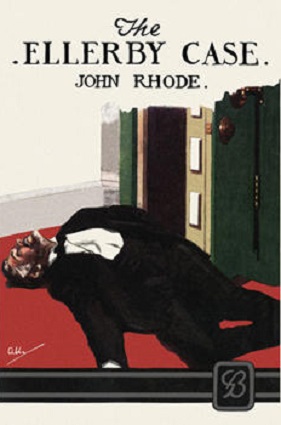
The Ellerby Case is a 1927 detective novel by John Rhode, the pen name of the British writer Cecil Street. It marked the third appearance of the armchair detective Lancelot Priestley, who featured in a long-running series of novels during the Golden Age of Detective Fiction. The novel's success led to a contract with Dodd Mead to release it and subsequent novels in the United States, in what proved to be a lucrative arrangement for the author.

The Murders in Praed Street is a 1928 detective novel by John Rhode, the pen name of the British writer Cecil Street. It features the fourth appearance of the armchair detective Lancelot Priestley, who figured in a long-running series of novels during the Golden Age of Detective Fiction.
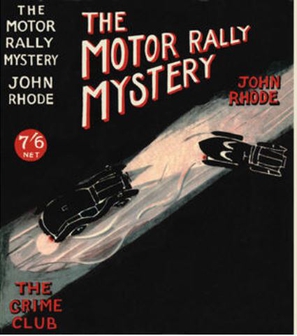
The Motor Rally Mystery is a 1933 detective novel by John Rhode, the pen name of the British writer Cecil Street. It is the fourteenth in his long-running series of novels featuring Lancelot Priestley, a Golden Age armchair detective. It was published in the United States by Dodd Mead under the alternative title Dr. Priestley Lays a Trap. It takes place against the backdrop of the real life RAC Motor Rally, which concluded at Torquay.

The Robthorne Mystery is a 1934 detective novel by John Rhode, the pen name of the British writer Cecil Street. It is the seventeenth in his long-running series of novels featuring Lancelot Priestley, a Golden Age armchair detective. It was published in the United States the same year by Dodd Mead.
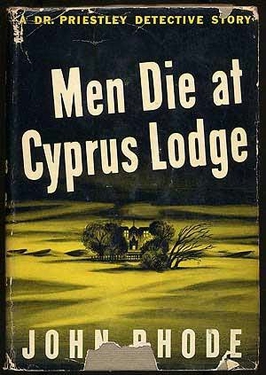
Men Die at Cyprus Lodge is a 1943 detective novel by John Rhode, the pen name of the British writer Cecil Street. It is the thirty eighth in his long-running series of novels featuring Lancelot Priestley, a Golden Age armchair detective. Reviewing it for the San Francisco Chronicle, Anthony Boucher wrote "at his best, nobody can touch Rhode for ingenious murder gadgets and very few can top him for meticulous unravelling; he's very close his best in this one".

Death at the Helm is a 1941 detective novel by John Rhode, the pen name of the British writer Cecil Street. It is the thirty fourth in his long-running series of novels featuring Lancelot Priestley, a Golden Age armchair detective. It makes reference to earlier stories in the series as the lawyer had defended in court the murderers Priestley had exposed in The Corpse in the Car and Death on the Boat Train. The characters in it were arguably more complexly drawn than in other books by the author.

Dead Men at the Folly is a 1932 detective novel by John Rhode, the pen name of the British writer Cecil Street. It is the thirteenth in his long-running series of novels featuring Lancelot Priestley, a Golden Age armchair detective. It was published in the United States by Dodd Mead.




















